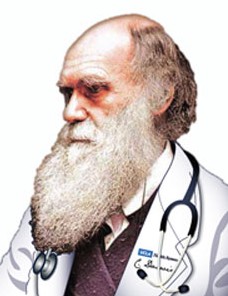One of the more irksome aspects of life is getting sick, I always think we should be beyond this. When it comes to medicine I suppose we can ourselves lucky to be alive at a time when doctors and butchers are no longer interchangeable. But even in the 21st century we’re still engaged in arms races with bacteria and chemical warfare with cancer (military metaphors are never in short supply) . Bacteria evolve resistant strains to our best antibiotics and tumours do likewise against our attempted cures. Less grave but still illustrative is the perennial persistence of the common cold. Illness comes in many forms, wellness only one. The main problems we face in trying to create cures is that all pathogens are evolving and to realise that we too have evolved. We often end up using static measures against dynamic problems.
That said, I think this century will see some considerable advances in medicine owing to the increasing use of evolutionary insights to combat disease. This is the science of evolutionary medicine.
Some of the symptoms we most associate with being sick like fever, pain, nausea and vomiting aren’t from the disease per se, but the body’s defences in action. Randolph Nesse, who wrote the book on evolutionary medicine, says that medical doctors would do well to recognise our evolutionary origins when treating their patients.
Our biology is playing catch up to our cultural advances and this lag period can explain many modern afflictions. Nobody reading this suffers from prolonged periods of hunger but we still stuff our faces when we get the chance. Of course, before modern civilization our next meal wasn’t always a sure thing, so gorging when the going is good was the way to go. The upshot of this is a significant proportion of the developed world is obese.
Some of the ideas of evolutionary medicine seem to run counter to our regular approach and our intuition. For instance, when treating a patient with chemotherapy, we use the most potent chemicals and this seems perfectly reasonable. We want to hit the tumour hard and fast. In fact, all we do then is put a strong selective pressure on the tumour cells to evolve resistance, ultimately shortening the patients’ lives. Instead, we should only give the minimum dose necessary to keep the cancer under control.
Fleming’s discovery of penicillin is one of those instances of serendipity that turned out to be a great boon for medicine. But I’d prefer not to rely on serendipity if you don’t mind! It would be far preferable to know why how and why diseases arise. Bernard Crespi is doing this with his research on schizophrenia and autism. Crespi argues that these disorders are diametrically opposed, autism is the result of an underdeveloped social brain whereas schizophrenia comes from a hyper-developed one. They are caused by the abnormal expression of imprinted genes, i.e. ones expressed according to the parent they came from. If true, then we can use opposing treatments to treat these twinned disorders.
Unfortunately, as Richard Dawkins puts it, we evolved to be fecund not necessarily to be healthy. Any competition between the two and the latter won out. But now at least we know that’s the case and we can do something about it.
Author
Adam Kane: kanead[at]tcd.ie
Photo credit
Dr. Barbara Natterson-Horowitz


